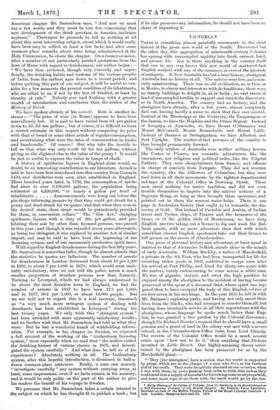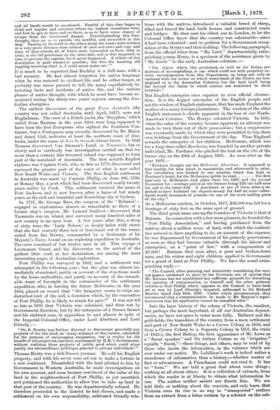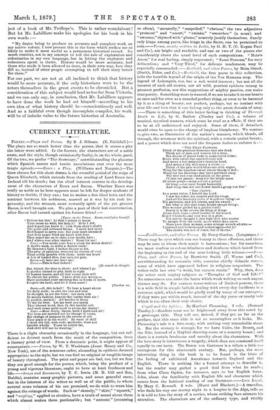VICTORIA.*
THERE is something almost painfully unromantic in the short history of the great new world of the South. Discovered but the other clay, this aggregation of nineteenth-century Colonies has sprung with unexampled rapidity into fresh, earnest, hard, and prosaic life. Nor is there anything in the country itself that can in any way invest this new world of matter-of-fact English workers with any of the romance, or even of the interest, of antiquity. If New Australia has but a brief history, aboriginal Australia has no history at all. The natives were few, and emin- ently uninteresting. There was no old eivilisation, as in Peru or in Mexico, to charm and interest us with its traditions ; there were no stately buildings to delight in, as in India; no vast tracts of land of unexampled fertility to support and enrich the discoverer,
as in North America. The country had no history, and the aborigines have already, after a few years, almost completely died out, leaving hardly a name to show that they ever existed. Instead of the Mississippi or the Godavery, the Tungumgua or the Jamna, we have the Hopkins and the Prince Regent. Instead of Arequipa or Ayacucho, we have Mount O'Shanassy and Mount McConnell, Mount Remarkable and Mount Little.
Instead of Benares or Seringapatam, we have Alberton and Port Upright. The matter-of-fact newness of the country is thus brought prominently forward.
The early settlers of Australia were neither military heroes, like Cortes or Pizarro, nor romantic adventurers, like the buccaneers, nor religious and political exiles, like the Pilgrim Fathers. They were sheep-farmers from Sussex, and officers in charge of convicts from Newgate. They did not overrun the country, like the followers of Columbus, but they were tied down in all their movements by the tightest departmental red-tape of the Colonial Office in Downing Street. These men cared nothing for native tradition, and did not even
trouble themselves to inquire into the natives' notions of a Supreme Being, so long as they brought them opossums, and
pointed out to them the nearest water-holes. There is one page in Australian history that ought to be romantic, the dis- covery of Gold. But instead of Pactolus and Arabia, of Indian rivers and Tyriau ships, of Pizarro and the treasures of the Incas, or of the golden idols of Montezuma, we have dirty English navvies taking out a licence to dig and wash the Bal- larat quartz, with no more adventure than that with which somewhat cleaner English sportsmen take out their licence to kill grouse on the moors of Aberdeenshire.
One piece of personal history and adventure, at least equal in interest to that of Alexander Selkirk, stands alone in the annals of early Australia. William Buckley, a native of Macclesfield, a private in the 4th Foot, who had been transported for life for receiving stolen goods in 1803, contrived to escape soon after his arrival at Port Phillip, and lived for thirty-two years with the natives, vainly endeavouring to come across a white man. He was of gigantic stature, and owed the high position he enjoyed among the aborigines to the accident of having become possessed of the spear of a deceased chief, whose spirit was sup- posed then to have occupied the body of this English soldier of six feet seven in his stockings. In the year 1835 he fell in with Mr. Batman's exploring party, and having not only saved their lives from the blacks, who had arranged to murder them all, but having done invaluable service in all their negotiations with the aborigines, whose language he spoke much better than Eng- lish, he was granted a free pardon by the Colonial Governor ; though Sir Richard Bourke's request that he should have a small pension and a grant of land in the colony was met with a severe
refusal, in due Circumlocution-Office form, from Lord Glenelg. The records of the Colonial Office would be a much severer satire upon "how not to do it," than anything that Dickens invented in Lille Den-rit. One highly-amusing theory enter- tained by the aborigines has been preserved for us by the Macclesfield giant :— " They [the aborigines] have a notion that the world is supported by props, which are in the charge of a man who lives at the furthest end of the earth. They were dreadfully alarmed on one occasion, when I was with them, by news passing from tribe to tribe that unless they could send him a supply of tomahawks for cutting some more props with, and some more rope to tie them with, the earth would go by the run, *Early History of the Colony of Victoria, from its Discovery lo is: Establishment as a Se 1 - °serving Province of the British Empire. By Francis Pete Labilliere, Barrister-at-Law of the Middle Temple, Fellow of the Royal Colonial 'institute. 2 I Tole. Lonton : Sampson Low and Co. 1878. and all hands would be smothered. Fearful of this, they began to think and inquire and calculate where the highest mountains were, and how to get at then; and on them, so as to have some chance of escape from the threatened danger. Notwithstanding this fore- thought, they set to to provide the needful, and succeeded in this way. Passing on the word to the tribes along the coast, some settlers at a very great distance were robbed of axes and saws and rope and tires of dray-wheels, all of which were forwarded on from tribe to tribe, to the old gentleman on the other side, and as was supposed, in time to prevent the capsize, for it never happened. A tribute of this description is paid whenever possible; but who the knowing old juggling receiving-thief is, I could never make out.'" It is much to be regretted that Buckley is a dull man, with a bad memory. He had almost forgotten his native language
when he was restored to civilised life, and he either forgot, or probably was never pressed to tell, the many superlatively in- teresting facts and incidents of native life, and the various phases of native thought, with which he must have become ac- quainted during his thirty-two years' sojourn among the Aus- tralian aborigines.
The earliest discoverers of the great Terra Australia (the
country was not called Australia until April, 1817), were not Englishmen. The crew of a Dutch yacht, the Duyphen,' which sailed from Bantam in the year 1606, were long supposed to have been the first Europeans who sighted the Southern Con-
tinent; but a Portuguese map recently discovered by Mr. Major, and dated 1542, indicates at least the northern coast of Aus- tralia, under the name of Jaye la Grande (Great Java). In 1642 Tasman discovered Van Diemen's Land, or Tasmania, but so
slowly and so carelessly was investigation carried on, that for more than a century this favoured island was supposed to form part of the mainland of Australia. The first notable English explorer was Captain Cook, who, as late as 1770, discovered and surveyed the greater part of the coast of what is now called New South Wales and Victoria. The first English settlement in Australia was made by Captain Phillip, on June 8th, 1788, at Botany Bay, a port which had been discovered nearly twenty years earlier by Cook. This settlement received the name of Port Jackson, and is now known, after a lapse of but ninety years, as the rich and beautiful and flourishing city of Sydney.
In 1797, Mr. George Bass, the surgeon of the 'Reliance'— engaged in explorations almost as remarkable as those of a former ship's surgeon, Mr. Lemuel Gulliver—discovered that Tasmania was an island, and surveyed many hundred miles of new country in an open boat. A few years after this, a sloop of sixty tons, the 'Lady Nelson,' so deeply laden with stores that she had scarcely three feet of free-board out of the water, sailed from the Downs, commanded by a lieutenant of his Majesty's Navy, bound on an exploring expedition to Australia. The crew consisted of but twelve men in all. This voyage of Lieutenant Grant, and his discoveries on the arrival of the gallant little craft at her destination, are among the most interesting pages of Australian exploration.
Port Phillip was surveyed in 1802, and a settlement was attempted in the following year; but the plan was almost im- mediately abandoned, partly on account of the objections made by the home authorities, and partly on account of the remark- able want of foresight in the commander of the settlement
expedition, who, in leaving the future Melbourne, in the year 1804, placed on record that "the kangaroo seems to reign un- disturbed lord of the soil,-a dominion which, by the evacuation of Port Phillip, he is likely to retain for ages !" It was not till as late as 1835 that Victoria was colonised, and then not by Government direction, but by the enterprise of a Sussex farmer and his stalwart sons, in opposition to and almost in spite of
the Imperial Colonial Office, under Lord Aberdeen and Lord Glenelg :—
"Sir R. Bourke was further directed to discourage generally any projects of the like kind, as many schemes of that nature, ostensibly for the purpose of encouraging emigration, but in reality for the benefit of the projectors, had been encouraged by H.M.'s Government, without realising those projects of public good which could alone justify the extraordinary privileges granted to private individuals."
Thomas Henty was a rich Sussex yeoman. He sold his English property, and with his seven sons set out to make a fortune in a new continent. Dissatisfied with the land allotted to him by Government in Western Australia, he made investigations on his own account, and soon became convinced of the value of the land in the neighbourhood of Port Phillip, as yet unsettled, and petitioned the authorities to allow him to take up land in that part of the country. He was departmentally refused. He therefore proceeded to the district he had chosen, and made a settlement on his own responsibility, cultivated friendly rela- tions with the natives, introduced a valuable breed of sheep,, tilled and fenced the land, built houses and constructed roads
and bridges. lie then sent his eldest son to London, to let the Colonial Office know that the country was colonisable—since it had been colonised—and to petition for a Government recog- nition of the Hentys and their holding. The following paragraph, from the official letter from "My Lord," departmentally extin- guishing young Henty, is a specimen of the assistance given by "My Lords" to the early Australian colonists :—
" The object, which this gentleman' as well as his father, are desirous of accomplishing, is one which could not with propriety re- ceive encouragement from this Department, as being not only at variance with the terms on which waste lands of the Crown are now disposed of in the Australian Colonies, but the land itself being far beyond the limits to which settlers are restricted in their. locations."
But English enterprise rises superior to even official obstruc- tion. It is the dogged enterprise of the English people, and not the wisdom of English statesman, that has made England the mother of so many foreign plantations. The wisdom of the elder English statesmen is chiefly apparent in the loss of our North- American Colonies. The Hentys colonised Victoria. In 1845„ when the value of the country became apparent, an attempt was made to turn them out of their possessions ; but a compromise
was eventually made, by which they were permitted to buy their own holdings from the Government of the day. Thus England rewards the enterprise of her children. Melbourne, which was for a long time called Bearbrass, was founded by another private individual, Mr. Fawkner, who pitched his tent on the site of the future city on the 29th of August, 1835. As soon after as the
year 1838,—
" Fawkner brought out the Melbourne Advertiser. It appeared at first weekly, for nine times in manuscript, and afterwards in print.. The circulation was limited to one number, which was kept at
Fawkner's hotel, for the Melbourne public to read The first land sale in Melbourne took place June 1st, 1837, and the second November 1st—average prices at the former being 235 the half-acre lot, and at the latter 242. A purchaser at one of these sales is re- ported to have forfeited his deposit-money for half an acre—after- wards worth thousands of pounds—in one of the most leading parts of the city."
At a Melbourne auction, in October, 1877, 246,500 was bid for a frontage of sixty feet on the same spot of ground.
The third great name among the founders of Victoria is that of Batman. In connection with a few more pioneers, he founded the "Port Philip Association," and having purchased from the- natives about a million acres of land, with which the authori-
ties refused to have anything to do, on account of the expense, he was dispossessed by Government of his princely possessions, as soon as they had become valuable (through his labour and enterprise), on a "point of law," with a compensation of £7,000! Batman died soon after, a poor and broken-down man, and his widow and eight children applied to Government for a grant of land at Port Phillip. We have the usual extin- guishing reply :—
"The Council, after perusing and attentively considering the vari- ous papers submitted to them by the Governor, are of opinion that Mr. Batman has not established any sufficient grounds for disturbing the question of compensation, to himself and the other primary settlers at Port Phillip, which appears to the Council to have been set at rest by Lord Glenelg's despatch, addressed to Sir Richard Bourke, dated July 10th, 1837. Under which circumstances, they recommend that a communication be made to Mr. Batman's repre- sentatives that his application cannot be complied with."
Into the later history of the colony of Victoria, the smallest, but perhaps the most important, of all our Australian depend- encies, we have not space to enter more fully. Ballarat and the gold-fields, the transition of the country from a mere settlement and part of New South Wales to a Crown Colony in 1850, and from a Crown Colony to a Separate Colony in 1855, the crisis of 1843-5, the first Bishop, the first appearance of Mr. Lowe as a "fluent speaker," and Sir Arthur Cotton as an "irrigator," equally "fluent,"—these things, and others, may be read of by those who desire the information, in the volumes which are now under our notice. Mr. Labilliere's work is indeed rather a storehouse of information than a history,—whether matter of fact or adventurous. A Frenchman could not read it. It has no "form." We are told a great deal about some things ; nothing at all about others. It is a collection of extracts, from which the reader is at liberty to obtain what information he can. The author neither assists nor directs him. We are told little or nothing about the convicts, and only learn that Victoria owes its rise in no way to " transported " settlers from an extract from a letter written by a colonist on the sub-
ject of a book of Mr. TroHope's. This is rather roundabout ! But let Mr. Labilliere make his apologies for his book in his own words :—
"My desire being to produce an accurate and complete work on my native colony, I now present this in the form which strikes me as likely to make it most useful as a permanent historical record. Its merit consists, not in my attempt to tell the tale of exploration and colonisation in my own language, but in letting the explorers and colonisers speak in theirs. History would be more accurate, had those who made it been allowed to state, in their own way, how they did so, instead of other people attempting to tell their story better for them."
For our part, we are not at all inclined to think that history would be more accurate, if the only historians were to be the
actors themselves in the great events to be chronicled. But a consideration of this subject would lead us too far from Victoria, and we can only say, in conclusion, that Mr. Labilliere appears to have done the work he had set hintself—according to his own idea of what history should be—conscientiously and well.
And as a faithful even though incomplete compiler, his work will be of infinite value to the future historian of Australia.




































 Previous page
Previous page